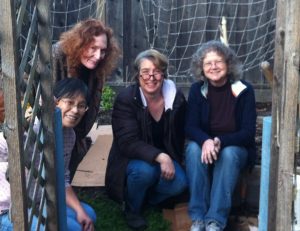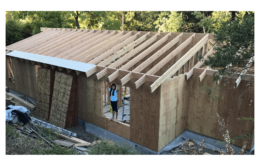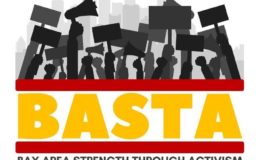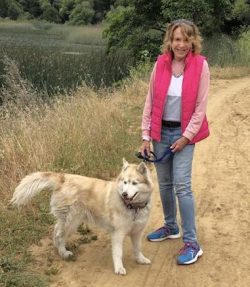Break an addiction this year with the Eastbay Area Reciprocity Network
- By : Saundra Hodges
- Category : Community, Featured Story
- Tags: Community, Reciprocity, Timebanking
Most of us have a hard time asking for help when we face a difficult challenge. Usually we assume we can struggle through it by ourselves, and often we do, but at what personal cost? We are also convinced that we must be self sufficient even if we have ties with close friends and/or a community of common interest who would be more than happy to lend a hand or an item. And, we often incur significant expense and inconvenience to maintain this veneer of self sufficiency. A generous friend in Castro Valley told this story about having bought an electric shredder to create mulch from pruning his yard. He told his neighbors how wonderful this new toy was, and to his chagrin, soon three of his neighbors had purchased the same shredder and each used it a few times a year, and the rest of the time it took up space in a yard shed or garage. How many of us could do with a little more space around our homes, yet we embrace the virtue of self sufficiency sometimes to the point of having to rent storage facilities or add backyard sheds to house all that stuff. We resist asking for assistance because we have this feeling that we shouldn’t inconvenience anyone else, but the reality is, most people volunteer their time and share resources willingly because they feel good about being useful to others. Think about this – if your automobile was going to be out of commission for a couple of days and you could do without it other than needing to shop for groceries in a day or two, what would you do? Call a taxi, rent a car, order online? Some people are comfortable asking for favors from people they know well, but imagine that you are new to a community and don’t know many people yet.
We resist asking for assistance because we have this feeling that we shouldn’t inconvenience anyone else, but the reality is, most people volunteer their time and share resources willingly because they feel good about being useful to others. Think about this – if your automobile was going to be out of commission for a couple of days and you could do without it other than needing to shop for groceries in a day or two, what would you do? Call a taxi, rent a car, order online? Some people are comfortable asking for favors from people they know well, but imagine that you are new to a community and don’t know many people yet.
Now, let’s turn the tables. If someone moved in across the street from you a month ago, and you introduced yourself but not had much interaction, how would you feel if she knocked on your door and asked if she could catch a ride with you on your next trip to the grocery store? If you are like most people, you’d be delighted to help, and if you are like some of us, you’d also be thrilled that you helped reduce the environmental impact of an extra automobile trip. You would feel good about making the connection and it is likely that the relationship would blossom into other mutually beneficial arrangements.
Why are we so hesitant to ask for a favor? There is another aspect of the lesson “it is more blessed to give than to receive” that most of us have accepted as a good value. If we deprive others of opportunities to give, then we are denying them that blessing. Humbling ourselves to ask for help or graciously accepting another person’s offer to help acknowledges the dignity of the giver by recognizing and honoring their caring capacity. Also, sometimes we view others as less capable of giving, and that undermines their sense of competence and self worth. To quote TimeBanks USA, “There are no throw-away people”. Everyone has value and sometimes we can help them recognize it in themselves.
I know at least four people/families who have faced homelessness or near homelessness in the past couple of years. The affordable housing shortage is only one situation that is impacting the well being of our communities, and many of us might be only one health or job calamity away from having our world collapse around us. We are fortunate to live in an area with multiple options to help people experiencing food or home insecurity, but those resources are tight. Sometimes all it takes is someone who cares enough to offer a word of encouragement, temporary refuge, or a nudge towards the right resource to help someone out of a difficult situation. Once people regain a foothold in the community, organized reciprocity provides the recipients of support an avenue to give back.

If these ideas resonate with you, join a movement that is gaining momentum and has a growing presence in this area. Eastbay Area Reciprocity Network is a time bank affiliated with TimeBanks USA. A time bank is an organization that values time as a currency we all are gifted with, and recognizes the equal value of every person’s time. Participants earn time to deposit in their accounts by doing things for others, and spend time by allowing someone to do something for them. This provides an excellent way for us to break our addiction to going it alone, because the opportunities to reciprocate give us “permission”. Our organization is relatively new in the time banking world, but we are growing and plan to engage on a broader scale throughout the East Bay this year. Please visit us at www.earn.timebanks.org and check out our mission and goals and find out how to join. You can also explore more about time banking by visiting TimeBanks USA at www.timebanks.org.



Thank you Saundra for such a thought provoking piece…so true! And with the recent popularity of the NextDoor neighborhood site we’ve seen a lot of postings from folks looking for assistance with everything from tearing down a backyard shed to shoveling gravel. I’ll be posting the link to your blog on my NextDoor network and look into joining myself. Time Banking seems an excellent way not only to save money but to become more connected with our neighbors and community. Thank you!
Would love to have you join Christine! We have an info session / orientation scheduled for March 12 in the afternoon in conjunction with a gardening work party. It will be held in Hayward and the host has an amazing green thumb. If you sign up on our website in advance, we can send you the details directly.
Loved the post.
To Sandra in Castro Valley,
Hello sandra,
My name is Bill Benjamin, and we once left messages on our respective phones.
I wish to find out more about your services for ad hoc caregiving and if possible,
would like to arrange a consultation with you.
My email is below, and we can communicate with that. We live in Castro Valley.
Many thanks,
Bill Benjamin